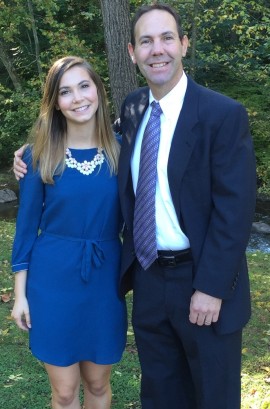The Bailout
In my short time as a counselor, I’ve encountered parents who profess virtual powerlessness in the face of the behavior and choices of their young adult and mature adult children, from their late teens to late 20s.
The child rules the roost, while the parents, frayed, demoralized and depressed, submit to the child’s willful and controlling ways. I feel for the parents and their conundrum. It must be a weighty burden to worry ceaselessly about your child, indulge the illusion  that one can control their child’s fate, bail out the child at every turn, and feel eternally responsible for the child’s life choices and outcomes.
that one can control their child’s fate, bail out the child at every turn, and feel eternally responsible for the child’s life choices and outcomes.
At the core of this feeling of parental helplessness is confusion over protecting a child – from danger, failure, mistakes, homelessness or even projected death – versus enabling behavior that avoids individual responsibility and experiencing consequences. Intentions may be good; results are not. Such smothering and shielding behavior on the part of parents contributes to the arresting of the child’s growth and development. Twenty-five-year-olds essentially are frozen at 15, having learned how to game one or both parents to their advantage and escape accountability. The longer the pattern continues and the parent remains the bailer, the less motivation the child has to change.
Sometimes, one parent contends, their spouse is to blame for their own helplessness, because the spouse is over-protective and unable to let go. One parent claims to try endlessly to set their stunted child free, but the other parent overrules them, shuts them down and continues down the same corrosive path, as the spurned parent becomes relegated to anemic bystander, tilting at windmills. But this is just an excuse to forgive the method the child uses to manipulate the parents to get what they want, just like the child learned as a little kid. While the parents will blame the child – “He just refuses to get a job, what can you do?!” “I can’t believe how she talks to her mother! She has no respect!” – the parents are the ones who fail to unite themselves and stick to any set of boundaries, rules or principles that would render their child’s behavior ineffective and counterproductive.
Fear, guilt and a desire to control immobilize the parent from allowing their child to make their own choices, accept responsibility, experience consequences, learn from mistakes and live their own lives. The result is a pattern of co-dependency that is difficult to break. The child never breaks away from at least one parent, while the other parent may become a spare part, suffering in self-imposed silence or virtual exile. The child depends on the parent to coddle and protect, providing safe haven from having to grow up and contend with an uncertain and uncaring world, from taking a risk, from self-determination. The parent depends on the child’s feigned incompetence and irresponsibility to feel needed, helpful and good about himself/herself, to validate their duty as a parent by doing “anything” for their child, to fulfill the role of protector and savior.
Adults in their 20s who are capable of living independently are essentially rewarded for their “failure to launch.” They don’t need a job because their basic financial needs – shelter, food, electricity, water, health care – are provided, as are wants such as cable TV and a car. So they don’t bother to seek one; holding a job would require taking individual responsibility. They don’t attend school because they have no motivation to set goals. They live at their parents’ home because it’s a safer bet – all the accountability is heaped on the parents — and easier. The unavoidable hassles and conflicts with the parents and turmoil in the household are just part of the bargain. They bum money as needed, claiming it is for one purpose while in some cases the parents providing the money know all along it is for drugs or alcohol, and resent giving in, but give in they ultimately do to maintain the dependent relationship.
Young adults living with their parents is a prevalent U.S. social trend: The U.S. Census Bureau found that more than one-third of people aged 18 to 34 lived under their parents’ roof in 2015; 10 years earlier, the percentage was about one-fourth. Nearly 9 of 10 who had lived with their parents in 2014 still did a year later. Indicating a rise in parental bailouts, the survey ominously found that 1 in 4 young adults aged 25 to 34 living in their parents’ home neither attended school nor worked.
I am grateful and proud that my kids are heading toward independent lives, on schedule. My 22-year-old daughter graduated college and is teaching in France. My 19-year-old son is attending college, majoring in computer science, and working part-time for UPS in logistics. If one of them holed up in my basement and refused to crawl out into their own life, I can’t be sure what I would do. I would hope I wouldn’t cave in and cater to dysfunction, irresponsibility and manipulation, but until you walk in someone else’s shoes…Thankfully, I don’t think my kids will give me the chance to wear those shoes.
One school of therapy posits that all human motivation is intentional, that all behavior is purposeful. Human behavior seeks to shape the world to satisfy at least one human need. For adults who have failed to launch, that need often is self-preservation. The anxiety and doubt of relying on oneself breeds dependence and escape from responsibility. Their behavior sends the message that the world is a scary place that expects something from us; the goal is to remain safe and preserve ego. If you don’t attempt, you can’t fail. Parents who are too willing to satisfy the need become the enablers, the practitioners of the bailout, who perpetuate their adult children’s prolonged adolescence.


 but I am earning a good paycheck here, and in general it resolves this cognitive dissonance in favor of the familiar. At the bottom of every dilemma is fear.”
but I am earning a good paycheck here, and in general it resolves this cognitive dissonance in favor of the familiar. At the bottom of every dilemma is fear.” burying the hurt, anger, disappointment, sadness or other negative emotions until one day they boil over and surface in a torrent, providing release for the emotional-baggage carrier and a knockdown punch for the recipient of the pent-up emotions, unaware of the depth and intensity of feelings. I’ve been on both the unleashing and receiving ends of the bubbling emotional volcanos, and it’s never pretty.
burying the hurt, anger, disappointment, sadness or other negative emotions until one day they boil over and surface in a torrent, providing release for the emotional-baggage carrier and a knockdown punch for the recipient of the pent-up emotions, unaware of the depth and intensity of feelings. I’ve been on both the unleashing and receiving ends of the bubbling emotional volcanos, and it’s never pretty. assignment teaching English in two French middle schools, her first professional job after graduating college. This will be her second tour abroad, following a semester in college in which she studied at the University of Lyon in Lyon, France, and traveled throughout Europe.
assignment teaching English in two French middle schools, her first professional job after graduating college. This will be her second tour abroad, following a semester in college in which she studied at the University of Lyon in Lyon, France, and traveled throughout Europe.
 What are the odds that a father and a daughter would graduate from different universities on the same day?
What are the odds that a father and a daughter would graduate from different universities on the same day?